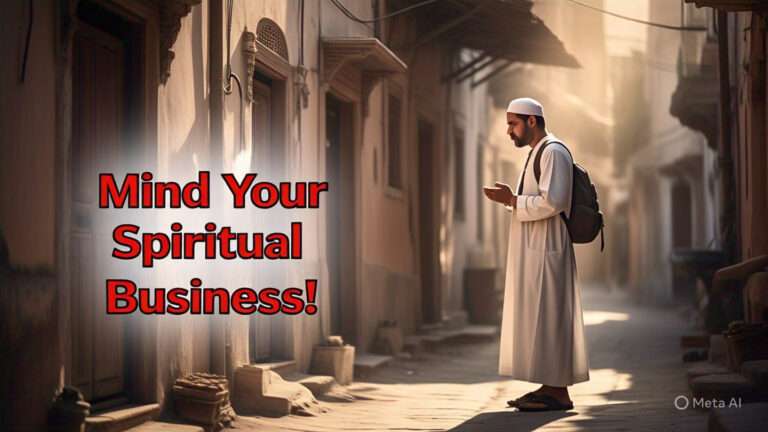The Silent Path: Mind Your Soul, Not Everyone Else’s
Let’s face it: we live in a world where scrolling is faster than thinking, and opinions—Islamic or otherwise—are dispensed like TikTok trends. Everyone’s a scholar, a judge, or a self-appointed “deenfluencer.” But sometimes, the loudest spiritual growth is the one you don’t broadcast. It’s quiet, personal, and done for the sake of Allah alone. Welcome to The Silent Path.
Prophet Vibes: Quiet Devotion, Loud Impact
If you’re worried that flying under the spiritual radar means you’re not “doing enough,” remember who set the example: Prophet Muhammad (ﷺ) himself. He wasn’t flaunting his piety for clout; his worship was intimate, sincere, and consistent.
Allah reminds us in the Qur’an:
“And when My servants ask you concerning Me, indeed I am near. I respond to the invocation of the supplicant when he calls upon Me.”
— Surah Al-Baqarah 2:186
Translation: You don’t need a massive platform or followers to be heard. Just raise your hands and speak to your Lord.
And then there were the Sahabah, the real OGs of silent sincerity. Take Sayidina Abu Bakr (RA) — he was the kind of guy who would sneak out at night to care for widows and orphans, never mentioning a word about it. Pure intention, zero marketing.
Scroll Less, Reflect More
Let’s be real. Social media didn’t invent comparison culture, but it sure turbo-charged it. Now, you can feel like a failure in faith just by watching someone else’s perfectly filtered Fajr reminder.
But Islam came prepared:
“And We do not burden any soul beyond its capacity.”
— Surah Al-Isra 17:15
Your spiritual journey is tailored just for you. It’s not a group project. What works for someone else might not work for you—and that’s perfectly fine.
The Prophet (ﷺ) also made it clear:
“Actions are judged by intentions, and every person will get what they intended.”
— Sahih Bukhari 1
So even if your ibadah doesn’t look Instagram-worthy, it counts if it’s sincere.
Allah’s Mercy: More Expansive Than Your Feed
Feeling like you’ve fallen off the spiritual wagon? Good news: Allah doesn’t cancel people. In fact, He invites them back with open arms:
“Say, ‘O My servants who have transgressed against themselves, do not despair of the mercy of Allah. Indeed, Allah forgives all sins.’”
— Surah Az-Zumar 39:53
Unless you’re engaging in shirk (associating partners with Allah), you’re never too far gone:
“Indeed, Allah does not forgive association with Him, but He forgives what is less than that for whom He wills.”
— Surah An-Nisa 4:48
So yes, redemption is always on the table—as long as you’re honest with yourself and your Lord.
Your Intentions Are Between You and Allah
Some acts—like celebrating the Prophet’s birthday or visiting graves—spark theological debates hotter than a Twitter thread. But ask yourself: Why are you doing it?
If it stems from love, respect, and doesn’t contradict the core teachings of Islam, then you’re walking on a path of intention, not imitation.
As the Prophet (ﷺ) reminded us again and again: It’s the why behind the what that matters.
Walk Your Own Path. Quietly. Steadily.
The Prophet, his companions, and the early generations weren’t driven by public approval. They were fueled by ikhlas (sincerity), quiet nights of worship, and meaningful, personal connection with their Creator.
You don’t need to announce your salah, record your suhoor, or debate theology with strangers. You need to be real—with yourself and with Allah.
Worship privately. Reflect deeply. Forgive freely. And most of all, mind your own spiritual business.
Final Thought: Growth Is Between You and Allah
Islam isn’t a competition, it’s a commitment. The real journey happens in your heart, in your prayers, and in your quiet moments of reflection.
So next time you feel overwhelmed by the noise, step off the digital stage, take a deep breath, and walk the Silent Path — the one that leads straight to Allah, no followers required.

